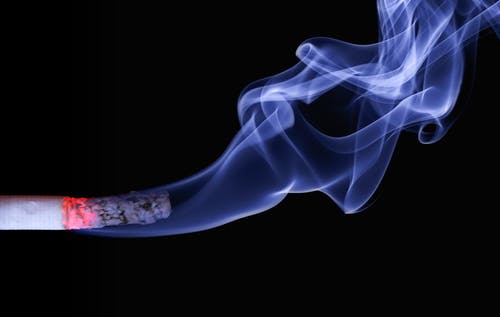circulation
If you smoke, the toxins from your cigarette tar enter your bloodstream. These contaminate your blood.
at that time:
- Increase your blood pressure, and increase the chance of clots forming
- Increase your blood pressure and heart rate, which makes your heart work harder than usual
- Narrow your blood vessels, and reduce the amount of oxygen rich running through your organs.
Collectively, these changes in your body when you smoke increase the chances of your arteries narrowing and clotting, which can lead to heart disease or stroke.
Smoking damages your heart and your blood circulation, increasing the risk of conditions such as coronary heart disease, heart attack, stroke, peripheral vascular disease (damaged blood vessels) and cerebrovascular disease (damaged arteries that carry blood to your brain).
Carbon monoxide from smoke and nicotine both add stress to the heart by making it work faster. They also increase the risk of blood clots. Some chemicals in cigarette smoke damage the lining of your blood vessels, leading to inflammation of the arteries.
In fact, smoking doubles the risk of heart attack, and if you smoke you are twice as likely to die from heart disease as non-smokers for the rest of your life.
The good news is that after just one year of not smoking, your risk is halved. After quitting 15 years, your risk is similar to that of a person who has never smoked.
Stomach
Smokers are more likely to get stomach cancer or ulcers. Smoking can slow down the muscles that control the lower extremities of your gullet (esophagus) and allow stomach acid to move in the wrong direction and regenerate your gullet, a process known as reflux.
Smoking increases the risk of kidney cancer, and the more you smoke, the greater the risk. For example, research has shown that if you regularly smoke 10 cigarettes a day, you are twice as likely to develop kidney cancer as a non-smoker. This is doubled if you smoke 20 or more cigarettes a day.
Smoking prematurely ages your skin for between 10 and 20 years, and gives you three times the chance of getting wrinkles on the face, especially around the eyes and mouth. Smoking also gives you a blue, yellow, and bare cheekbones, which can make you look skinny.
The good news is that if you stop smoking, you will prevent further damage to your skin caused by smoking.
Smoking can make your bones weak and cracked. Women should be especially careful as they are more likely to suffer from osteoporosis than non-smokers.
In fact, smoking increases the risk of stroke by at least 50%, which can lead to brain damage and death. And, by smoking, you double the risk of death from a stroke.
One way smoking can increase the risk of stroke by increasing your chances of having a brain aneurysm. This is a lump in the blood vessel caused by a weakness in the wall of the arteries. This can explode which will lead to a more serious condition known as subarachnoid haemorrhage, which is a type of stroke, and can cause serious brain damage and death.
Mouth and throat
Smoking causes unpleasant problems, such as shortness of breath and stained teeth, and can cause gum disease, damage your sense of taste and can lead to verbal abuse.
The most important damage caused by smoking in the mouth and throat is an increased risk of cancer of your lips, tongue, throat, voice box and gullet (esophagus). More than 93% of oropharyngeal cancers (cancer of the esophagus) are caused by smoking.
The good news is that if you stop smoking, or have been smoking for many years, you can greatly reduce your risk of developing head and neck cancer. If you have not smoked for about 20 years, your risk of developing head and neck cancer is reduced to a non-smoker.
Reproduction and fertility

Smoking can cause male impotence, as it damages the blood vessels that supply blood to the thigh. It can also damage the sperm, reduce sperm count and cause testicular cancer. Up to 120,000 men from the UK in their 20s and 30s are strong over smoking, and men who smoke have a lower sperm count than non-smokers.
For women, smoking can reduce fertility. One study found that smokers were three times more likely than nonsmokers who had been pregnant for more than a year. The study found that the prevalence of female smokers was 72% of non-smokers.
Smoking increases the risk of developing cervical cancer. Smokers are less likely to eradicate HPV infection, which can develop into cancer.
Smoking during pregnancy can lead to miscarriages, premature births, stillbirths and illness, and increase the risk of cot death by at least 25%.








Comments
Post a Comment